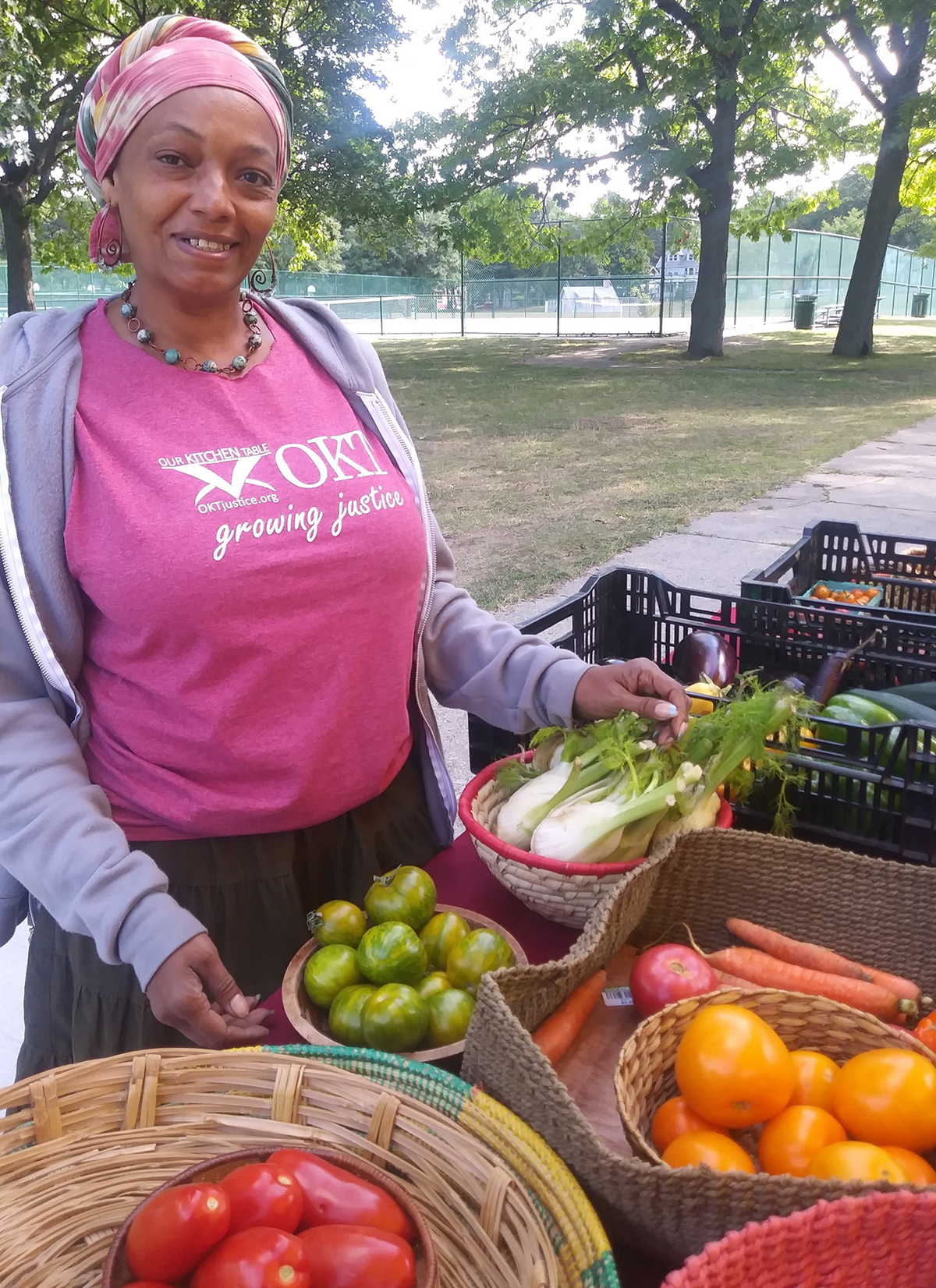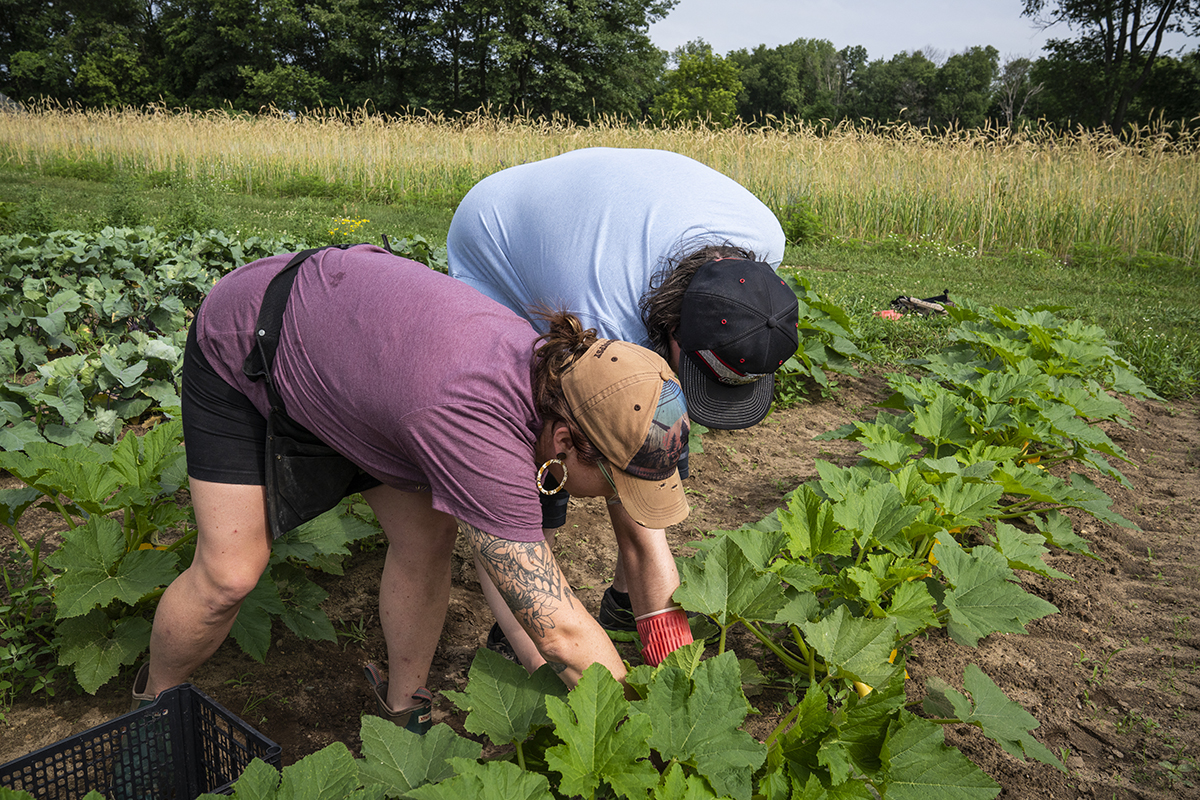WRITER | LISA BECKER CAMPBELL
One snail, with one drop of water on its back, inches its way to help other snails extinguish a fire.
This scenario was spoken into existence by activist and Nobel Prize winner Professor Wangari Matthai. And Lisa Oliver-King evoked the sentiment when she spoke about equality and access to food at the West Michigan Sustainable Business Forum last year.
Oliver-King is the executive director at Our Kitchen Table (OKT) in Grand Rapids, and her vision is for a more just, equitable food system in Kent County.
Since 2003, Our Kitchen Table has empowered families in four Grand Rapids neighborhoods ― Garfield Park, Southtown, Eastown, and Baxter ― to grow their own food. The grassroots nonprofit organization primarily serves these urban neighborhoods, promoting social justice and empowering the community to improve their health and environment through information, community organizing, and advocacy.
While healthy food and clean water are basic human rights, the pandemic exacerbated peoples’ needs. Food justice intersects with racism, women’s rights, animal rights, workers’ rights, clean air and water, academic equity, and public health, according to OKT. Contact the nonprofit and ask about the Food Policy for Food Justice series to learn more.
Our Kitchen Table believes that building viable, neighborhood-based, resident-led advocacy is fundamental to achieving its mission, including addressing food insecurity, food justice, nutrition, and environmental justice among women and their families through gardening and services supporting health.
Our Kitchen Table also advocates for equity when it comes to food-system availability. Public spaces should marry charitable organizations with retail operations and make produce available for free.
Rather than talking about food deserts ― a term that refers to a neighborhood’s lack of full-service grocery stores ― OKT advocates for dismantling “food apartheid,” the intentional, systemic marketing and distribution of profitable, nutrient-poor, disease-causing foods to income-challenged neighborhoods. And the neighborhoods receiving the most food assistance dollars are mainly communities of color, according to Oliver-King.
Oliver-King has stated that her dream is to create diversification in the food space that meets the needs of the community at large with the promise of no stigma or judgment. Those who access food without barriers should ensure that others can do so, too.
OKT’s programs currently include the Southeast Area Farmers Market, The Program for Growth, and Educate to Elevate.
OKT’s Zoom-based Educate to Elevate has supported pregnant women and moms caring for infants and young children with free monthly online cooking demos facilitated by a chef and registered dietitian throughout the pandemic. The easy recipes feature healthy, affordable whole foods that can be purchased with SNAP dollars at nearby grocery stores and farmers markets.
In partnership with the Grand Rapids Public Schools, The Program for Growth involves students and their parents/caregivers in food growing and healthy eating activities. Parents and caregivers meet weekly to tend the school garden, study with a registered dietician, prepare nutritious meals, and learn how to grow their own food at home.
Food garden coaches work with them to get past the initial obstacles in their relationship with food — whatever they may be. They help people work with the resources that they have.
“We ask: What do you have in your household? Is there an obstacle with electricity or gas? If there is, that’s okay, because there are so many other options. I have worked with people who use their coffee makers to boil chicken. People who grill due to lack of access to electricity or gas. We work with the resources they have and come up with creative solutions to educate people on how they can prepare food, regardless of limitations. There is no ‘one way,’ there is no right way,” Oliver-King stated on the website.
“I have always thought about food as it relates to power. I have the power of selecting what I want to eat, which items I want to purchase, and how I prepare my food. I get to choose what goes into my body. Ultimately, we teach others about food power. It means taking back control of what’s on the dinner table,” she said.
Our Kitchen Table
334 Burton Street SE
Grand Rapids MI 49507
(616) 206-3641 l OKTJjustice.org








